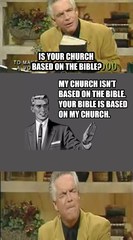You are right Jesus did set up a single church - but you are convinced that church is the Catholic one - I am asking you if that is indeed the case then how is the Catholic church of today so far removed from the church Jesus started?
It is not sufficient to say I do wrong because... you do wrong too. For you to answer my claims of where Catholic teachings differ from scripture with accusations of things that I do not believe that are in scripture is not an arguement at all. Especially when you do not know me, or what I believe.
I will show you Bible for every doctrine I hold and practice, can you do the same, or are you dependent on extra biblical even anti-biblical traditions to hold up your faith?
The Catholic Church defines doctrinal development as a growth of depth and clarity in the
understanding of the truths of divine revelation. It is important to understand that the
substantial or
essential truths at the core of each doctrine (as part of the one apostolic deposit, given from Christ to the apostles)
remain unchanged. The Catholic Church preserves this deposit, and is the Guardian of it. Only the subjective grasp of men increases,
without the actual doctrine or dogma changing in an essential way. This is the main distinction to keep in mind when considering development.
Doctrine clearly develops within Scripture itself (“progressive revelation”).
Some examples would be: doctrines of the afterlife, the Trinity, the Messiah (eventually revealed as God the Son), the Holy Spirit (a Divine Person in the New Testament), the equality of Jews and Gentiles, bodily resurrection, sacrifice of lambs evolving into the sacrifice of Christ, and so forth.
Not a single doctrine emerges in the Bible complete with no further need of development.
The canon of Scripture itself is an example of developing doctrine.
In general, whenever Holy Scripture refers to the increasing knowledge and maturity of Christians and the Church, an idea very similar to doctrinal development is present. Holy Scripture, then, is in no way hostile to development.
The Church is called the “Body” of Christ often (e.g., Eph 1:22-3), and is compared to a seed that grows into a tree (Mt 13:31-2). Seeds and bodies grow and expand. Yet Protestants tend to see Church and doctrine as more like a statue, subject to pigeon droppings (i.e., so-called Catholic “corruptions”!).
This robs the metaphors of Christ of their essential meaning.
Indeed, there is a lot of Scripture that would indicate the Trinity and Christology (Jesus as God), but if one doesn’t attempt to put the verses together in a certain systematic way, it wouldn’t jump right out from Scripture. So for that reason the Church had to
develop it — and usually in response to heretics.
Doctrines agreed upon by all develop, too.
- The Divinity or Godhood of Christ was only finalized in 325 at the Council of Nicaea,
- and the full doctrine of the Trinity in 381 at the Council of Constantinople.
- The dogma of the Two Natures of Christ (God and Man) was proclaimed in 451 at the Council of Chalcedon.
These decisions of General Councils of the Church were in response to challenging heresies. Why should Protestants accept these authoritative verdicts, but reject similar proclamations on Church government, the Eucharist, Mary, Purgatory, etc.?
Although understanding increases,
the essential elements of doctrines exist from the beginning. Today’s Church shouldn’t be expected to look like the primitive Church if it is a living, vibrant, spiritual organism. But even the early Church looks like a small “Catholic tree.” It doesn’t look like a Protestant “statue,” increasingly corrupted by an encroaching Catholicism, as one common viewpoint would have it.
The idea of doctrinal development is a key, in any case, for understanding why the Catholic Church often appears on the surface as fundamentally different than the early Church. Thoughtful Protestants owe it to themselves and intellectual honesty to ponder this indispensable notion
before criticizing the allegedly “unbiblical excesses” of Catholicism.
The theology of Christ, or Christology, continued to develop for hundreds of years after Christianity began. Virtually all Christians are agreed on this aspect of theology: the nature of Christ and the Trinity. But many aspects of these doctrines were developments, not explicitly found in the Bible.
So, for example, the heretical Nestorians came around and claimed that Jesus was two persons: human and divine. The Church said “no, that’s not true. He is one Person, the God-Man.” The Nestorians speculated falsely about the nature of Mary, but the Church pronounced on the doctrine of Mary, against the Nestorians, giving her the title of
Theotokos, which means “God-bearer,” or “Mother of God.” That occurred at the Council of Ephesus in 431. We often find, then, in Church history, heretics coming along and making a new claim. The Church reflects upon it, and rules against it.
The standard Protestant notion of its own origins and place in Church history is that the “Reformers” (in accordance with their very self-proclaimed title) restored what had been lost; what was originally the state of affairs in the early Church.
But this itself is a myth: demonstrably false, since the early Church does not resemble Protestantism much at all, the early Church looks far more like a small “Catholic tree” (e.g., episcopacy, Real Presence, baptismal regeneration, purgatory, priesthood, conciliarism, apostolic succession, penance, prayers for the dead, Mary as the New Eve and perpetual virgin, etc.).
Today’s Church shouldn’t be expected to look like the primitive Church if it is a living, vibrant, spiritual organism.

